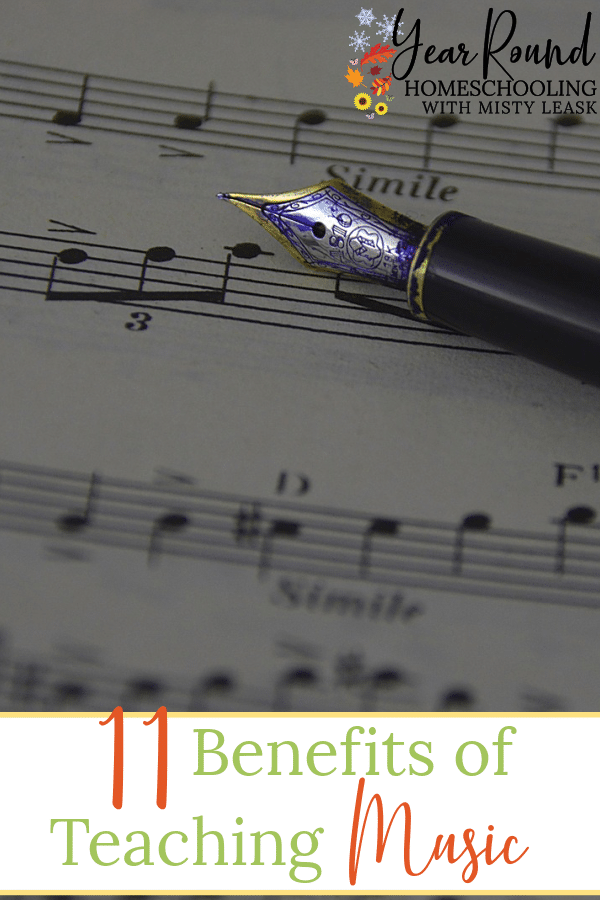Just because someone loves music, doesn’t mean they see, know or even believe the benefits of teaching music in their homeschool. Some people think enrolling their children in private lessons (piano, violin, voice, etc.) is simply enough.

11 Benefits of Teaching Music in Your Homeschool
While private lessons certainly bring their own set of benefits that I believe are important in their own right, I feel music should be taught and studied as a part of their “normal” and regular schooling. The benefits of studying music are literally numerous, but I would like to share 11 reasons why music is important to your homeschool.
1. Music promotes movement – Music is a great way to get your kids up and moving! For most people, music naturally makes you want to move. Whether it’s dancing, swaying, jumping, drumming or any other movement, your body enjoys music. Use it as a way to get kids up and exercising during those rainy, long hot summer days or frigid temperatures during the winter. It’s also a great way to get the wiggles out so kids are not sitting idle for too long!
2. Music teaches concentration – Concentration is something that cannot be taught, yet music is a great way to learn it. Playing music – whether one instrument or even singing – requires concentration. It is required not just for learning the basics of how-to’s, but also for memorizing theory, scales, words, notes and more. When performing it takes concentration to be able to follow along with the music, watch the conductor and play correctly while ignoring the audience.
3. Music improves critical thinking skills – Music is a multi-faceted art. There is no right way to interpret music, so therefore students are taught to think and solve problems more critically.
4. Music promotes coordination – Playing an instrument requires coordination. Even singing requires coordination – to breathe properly and sing the correct vowels to pronouncing the words clearly – it takes coordination. Keeping rhythm and time with the music requires coordination as well.
5. Music teaches craftsmanship (and paying attention to detail) – Music is an art – the way it’s created and ordered is a testament to the care a composer takes when writing a piece. Details are paramount and must be paid attention to, otherwise a great piece can quickly turn into a mediocre or even poor piece. When students learn about the process of creating music, this level of craftsmanship and paying attention to detail is transferred to their other subjects as well as demanding excellence in their personal life.
6. Music improves language skills – “Language competence is at the root of social competence. Musical experience strengthens the capacity to be verbally competent.” (source) Research shows that musicians who learned and were taught music from a young age also excelled in language and social skills. “Recent studies have clearly indicated that musical training physically develops the part of the left side of the brain known to be involved with processing language, and can actually wire the brain’s circuits in specific ways. Linking familiar songs to new information can also help imprint information on young minds,” says the Children’s Music Workshop. (source)
7. Music promotes discipline – While music can be both entertaining and fun, it is also an art form that requires a lot of discipline. As all my music teachers said, “Practice makes permanent, so practice perfectly.” Unless you are one of the very few prodigies in the world, it will take time to learn and perfect your musical abilities. Learning any art form requires many logged practice hours and therefore discipline. The discipline they learn in practicing their musical studies will spill over into their other studies and practices and will follow them into adulthood, giving them a strong work ethic, which will be beneficial for life.
8. Music teaches teamwork – As children get older, they may join an orchestra or band. These groups are not only great for improving discipline, but also for teaching teamwork. In order for a musical piece to sound well…like music…it must be played correctly, which takes practice and teamwork. Just as each member of a sports team has its specific “job” on the field, each musician and instrument has a specific set of notes to play that when combined together and in rhythm, creates a beautiful, melodious sound – pleasing to the ear.
9. Music improves spatial intelligence – Problem-solving is a skill that, unfortunately, many do not possess. Yet music has proven to improve spatial intelligence – or the ability to solve problems as simple as what to pack for a day at the park to more complex, multi-step problems found in architecture, engineering, math, art, gaming and working with computers.
10. Music has proven to increase overall intelligence or IQ – Surprisingly, children who were given music lessons over a 9-month school year tested on average three IQ points higher than the other groups – those who studied just drama and those who did no art studies. While this has been loosely tested, it is not to say that those who do not study music are incapable of increasing their IQ. It is, however, a testimony to the fact that music is a multi-faceted art form that is beneficial for more than just learning notes on a page.
11. Music is FUN! – While I believe this is a given, it is important to note. While music does require discipline, concentration and coordination – it can also be fun to learn, dance and move to it. Moving to music can release stress and it can also create a sense of calmness not only in the person but in the environment. When our house gets chaotic or the children are just plain wild, I often turn everything off and we listen to music. The mood instantly changes and calms down and we regain a sense of balance in the house.
While I am a huge supporter and lover of music, the benefits for teaching music definitely speak for themselves. The difference I see in my children versus those who are not around music is considerable.
I can also testify that I did see the benefits of each point made above in my personal life. The discipline that has carried me through college, jobs and even into marriage and parenthood. For me, the benefits far outweigh the negatives and for that reason, we will continue to include musical studies in our homeschool journey.
Do your children study music? What benefits have you seen while teaching music?
Music lessons can be expensive, but don’t let that hinder you from teaching music in your homeschool! Check out our music Pinterest board for ideas!
